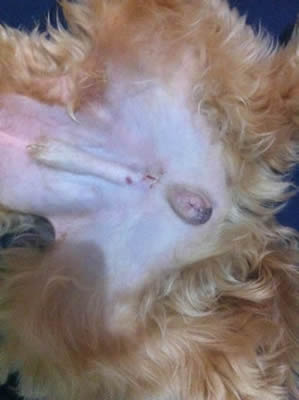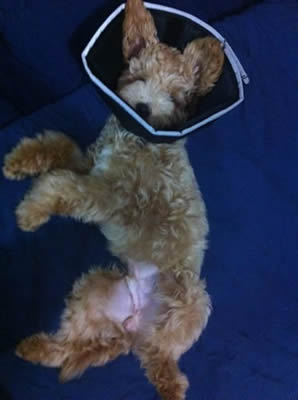Dog Neuter and Spay
Besides population control, dog neuter and spay procedure is strongly recommended for health and behavior reasons. Dog neuter and spay is performed to eliminate risk of testicular cancer in male dogs and reduce risk of mammary tumors and womb infections in female dogs. Behaviorally, neutered dogs display less territorial behavior such as urinating on furniture and aggression to other male dogs. For female dogs, spaying prevents being pursued by males when your female dog is in heat and makes it less likely your female dog will escape during heat to find a mate.
When to neuter and spay your dog?
Neuter and spay your dog when he or she is 5 to 7months old. You may hear that both the neuter and spay procedures can be done as early as 8-16 weeks of age (advised by American Veterinary Medical Association in 1993). But recent development and studies confirm that it is safer to wait until 5 to 7 months because the liver and kidneys of puppies are less mature and less capable of tolerating the effects of anesthetic drugs. Early neutering may also result in reduced body musculature, retaining juvenile behavior and increased risk of urinal infection due to inability to extrude their penises from their sheaths.
How to neuter and spay your dog?
First you should contact your local veterinarian clinic to schedule an appointment. Your veterinarian should explain to you the procedures to neutering / spaying your dog. In preparing for the actually surgery, your vet will tell you to fast (no food, water is fine) your dog the night before surgery. This is important as animals may vomit and result in fetal complications if they receive anesthetic on a full stomach. One exception is that puppies younger than 16 weeks should not be fasted for more than 8 hours prior to surgery.
Consult with your veterinarian about fasting procedures if you are neutering / spaying a puppy. You may also want to bath your dog before the surgery because you will not be able to for a couple weeks (to prevent stitches from getting wet). On surgery day, the vet will give your dog an examination. If your dog is fit for the neuter and spay procedure, your vet will explain to you the risks of general anesthetic and ask you to sign a consent form. Once the documents are signed and you provide your contact details, your dog will be admitted to surgery and you will be given a time to return.
Post neuter and spay care
Before you leave the veterinary clinic, ask your vet what and how much your dog should eat on the first night. Normally it is fine to feed your dog his regular meal the night after surgery. Don’t be too concerned if your dog does not finish the food, it is not uncommon to have sore stomach or lack of appetite after surgery. If your dog’s medication requires taking with food, make sure you dog consumes something. Even if this means tempting him with roasted skinless chicken meat. Your dog’s appetite should be back the following day. Call your vet if he does not eat for more than 24 hours after surgery. There is nothing special you need to do regarding the wound, just like wounds on humans, clean the area to make sure it stays clean.


It will take 10 to 14 days for the wound to heal. During this period make sure the wound does not get infected and your dog should not exercise rigorously or take baths either. Look out for redness, yellow/green puss or swelling which are signs of infection. Use an Elizabethan collar (E color) to prevent your dog from licking his wound which may lead to infections. Give your dog pain relievers for dogs if he is experiencing obvious discomfort. Do not give human pain killers to your dog. Contact your veterinary clinic if you experience complications after neuter and spay surgery.
